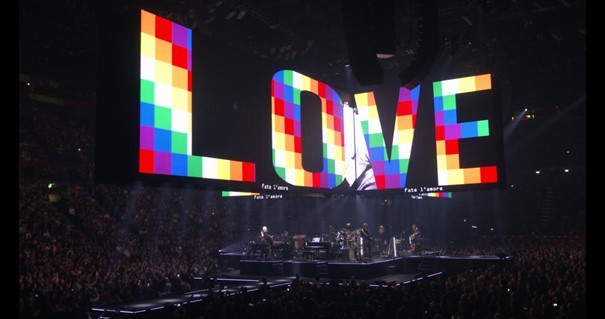All art is propaganda and ever must be, despite the wailing of the purists.
W.E.B DuBois
I recently had the opportunity to attend a concert by Roger Waters – best known as the co-founder of Pink Floyd – to promote various campaigns advocating the freedom of Julian Assange. I went there as part of the pan-European political movement, DiEM25, which also has its own petition against Assange’s extradition.
This experience gave me opportunities to discuss and contemplate the relationship between arts and politics. As W.E.B DuBois has stated, art can never be completely neutral in its political stance. This is of course true for basically all human activity, as it always takes place in a specific context and therefore relates to – or comments on – that context. (For more on DuBois, see my earlier post.)
Artistic responses to socio-political issues
In the polarised times we currently live in, some people seek ‘neutral’ spaces where they can just ‘be themselves’ and enjoy the moment. Such a space may be a sports event or entertainment such as music. There are an abundance of examples of such spaces of which politics should be ‘kept out of’ in the views of some. Recent examples are the World Championship football tournament in Qatar 2022 and the Eurovision competition in Israel 2019. Whether such music is the kind of art DuBois refers to, is a broader discussion for another time. For artistic – purely musical, if you will – responses to political changes, see my earlier post on modern music.
While in the 60s and 70s pop and rock music – the latter still carrying some of its folk roots – could have quite some political messaging in the lyrics, nowadays popular music as a carrier of a message has become an increasingly multimedial endeavour. During the golden years of MTV, music video developed into its own form of artistic expression, sometimes with little relation to the song playing as a sort of soundtrack for the video. But often the video offered a clever alternative interpretation of the lyrics.
The genre that probably carries the most amount of political messaging is hip-hop. Rapping in hip-hop – also known as ‘Rhythm and Poetry‘ – is a form of word art, and many rappers are very talented in expressing their thoughts about the world through their art. Hip-hop emerged right into the MTV age and made full use of the new visual language. Often, however, hip-hop lyrics are too strong and direct to be accompanied by a secondary visual story line. Lowkey’s Free Assange below is a prime example.
Roger Waters’ artistic activism
Roger Waters’ music is certainly popular in the commercial sense I have discussed previously, and it has received much critical claim. He has, however, never shied away from using his music as a platform for his political beliefs and the experience his concert gave me carried a very strong political message – while being very entertaining and musically enjoyable. I.e. there was a balance between the ‘show’ and the ‘message.’ I will come back to this later.
On the This is not a drill tour, he makes very clear from the start that his political views are an integral part of his art. The music of Waters itself – without the lyrics, that is – has little political connotations beyond some march-like rhythms to resemble totalitarianism. Distorted guitars may of course also be perceived as referring to machine sounds, but they are perhaps too ubiquitous in our times to very strongly bring that kind of association. However, as already mentioned, music for Waters is a vehicle for expressing his views of the world.
In live context, lights, smoke generators, and pyrotechnics have long been standard repertoire in popular music concerts. Contemporary LED screen technology adds a whole new layer to the storytelling of the musician, and Roger Waters certainly made full use of these possibilities. While his lyrics may or may not speak of a particular wrong in the world, the screens often told a very specific story.
The below clip of the song Powers that be was for me one of the most touching moments of the concert. The song lyrics speak of the misuse of power by the elites – a rather timeless narrative. The animation and texts on the screen, however, contextualise the song within the contemporary struggles of e.g. Iranian women (Masha Amini), American blacks (e.g George Floyd) and victims of state violence.
Reception
It was interesting to observe the reception of Waters’ activist message during the event. The audience was largely of Waters’ generation and in general not very interested in the political side of his art. Of the 17 000 fans, a handful came to our stand with the Free Assange material. I don’t know whether the activists of the BDS movement on the other side had better success. But as you can see in the video above, the stories shown on the screens and juxtaposed with the music did solicit responses from the audience.
This, in my view, is always the challenge of activism through the arts. Artistic experience happens in a moment that may include some deeper socio-political messaging. Art – especially music – is, however, capable of inducing an experience independently of the message. We saw this very clearly, as the concert goers were not particularly more open to our message after hearing it from Roger Waters.
To return to DuBois’ comment in the beginning, art always makes a statement of some kind about the world around it. It may be an engaging statement, calling for action, or just an observation. It is ultimately the receiver – viewer or listener – of the artistic expression that responds to it in a particular way. There’s also the subliminal part of the experience, which may surface much later in a realisation regarding something that was part of the art work. I.e. we shouldn’t draw too hasty conclusions from the above described audience responses to the political messaging during Roger Waters’ tour – on and offstage. The Assange debacle, but especially the Palestinian situation, have endured a long time with no quick solution in sight. Hopefully the tens of thousands of people Waters’ message reaches during his tour help change sentiments regarding these, and the many more issues he touches, and helps us towards a better world.

